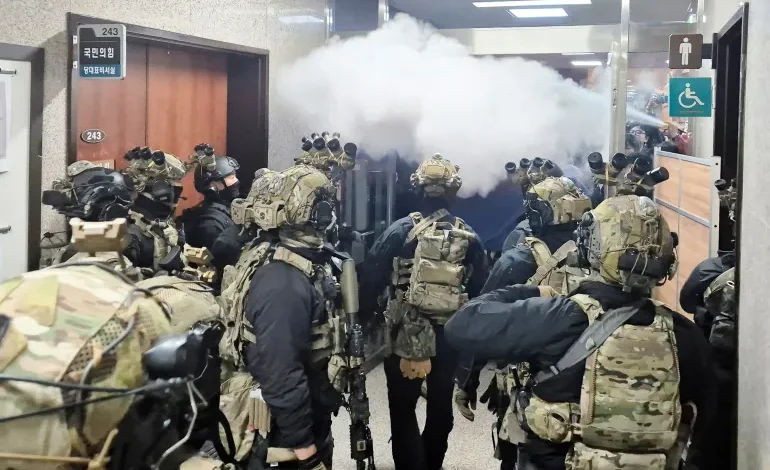South Korea Averted Coup Attempt as Parliament Rejects Yoon’s Martial Law Declaration

South Korea narrowly averted a potential constitutional crisis late Tuesday after President Yoon Suk Yeol declared a state of emergency martial law, only to see the National Assembly swiftly reject the decree, Al Jazeera reports.
The unprecedented move, ostensibly aimed at combating perceived threats from North Korea and quashing what Yoon termed “anti-state” opposition forces, sparked immediate protests and widespread condemnation.
The military, acting on Yoon’s orders, announced sweeping restrictions including a ban on all political activity and the seizure of media control under the Martial Law Command. However, hours later, the parliament, surrounded by both protesters and a heavy police presence, voted overwhelmingly to overturn the presidential decree.
The dramatic events unfolded against a backdrop of escalating political tensions between President Yoon’s ruling People Power Party (PPP) and the dominant opposition Democratic Party (DP), which secured a landslide victory in April’s National Assembly elections.
The timeline leading to the martial law declaration reveals a growing rift between the two factions:
- April 11: The DP wins a resounding victory in the National Assembly elections, securing over 60% of the seats.
- May 9: President Yoon apologizes on behalf of his wife, First Lady Kim Keon-hee, following accusations of illicitly receiving a luxury handbag.
- August 27: The government proposes a ₩677.4 trillion ($483 billion) budget.
- October 25: South Korea expresses concern over a potential Russia-North Korea defense pact.
- November 25: DP leader Lee Jae-myung is acquitted on perjury charges.
- November 26: President Yoon vetoes an opposition bill calling for a special counsel investigation into allegations against his wife. This was his third veto of such a bill.
- November 29: The opposition significantly cuts the government’s proposed budget, targeting funds for Yoon’s office, the prosecution, police, and the state audit agency.
- December 2: The DP submits impeachment motions against three top prosecutors, a move the PPP described as a vendetta. President Yoon’s approval rating plummets to 25%, according to Realmeter.
- December 3: President Yoon declares martial law, claiming he aims to “rebuild a free and democratic country.” Parliament immediately rejects the decree.
The swift rejection of the martial law declaration has been hailed by many as a victory for democracy. However, the underlying political tensions remain, raising concerns about the future stability of South Korea.








